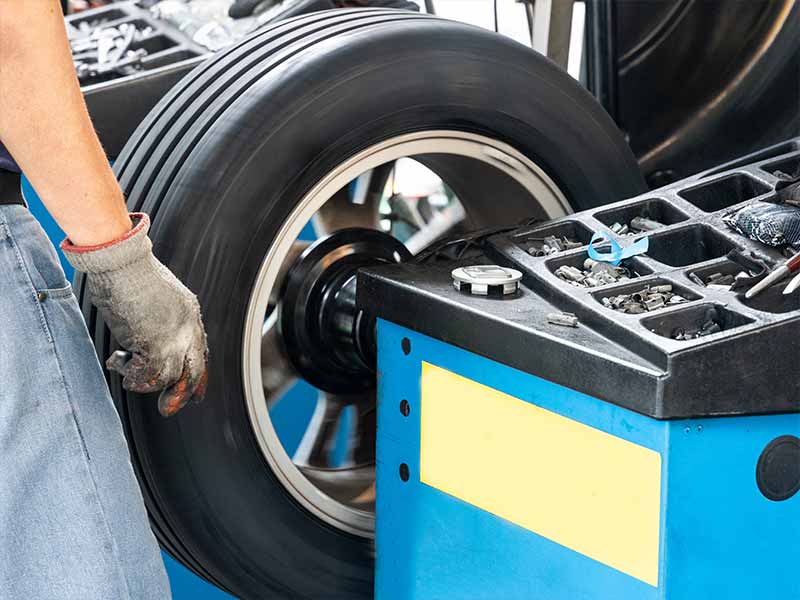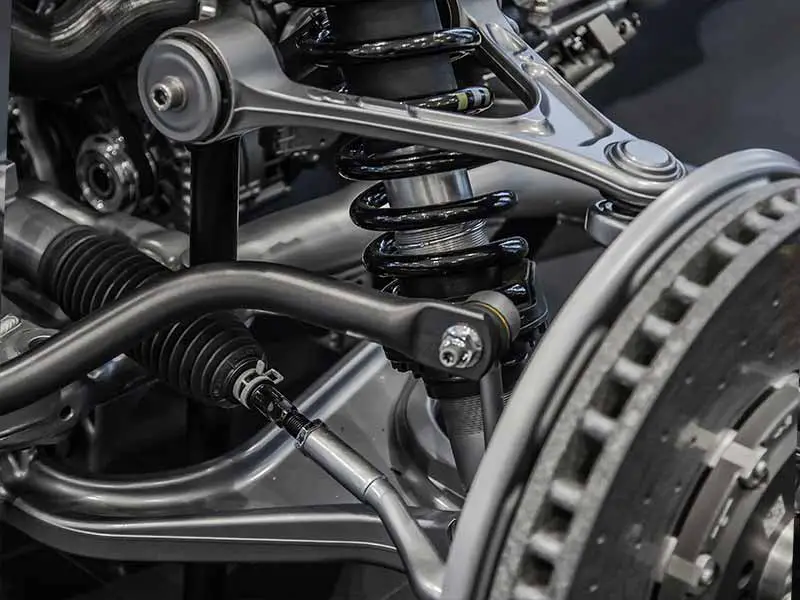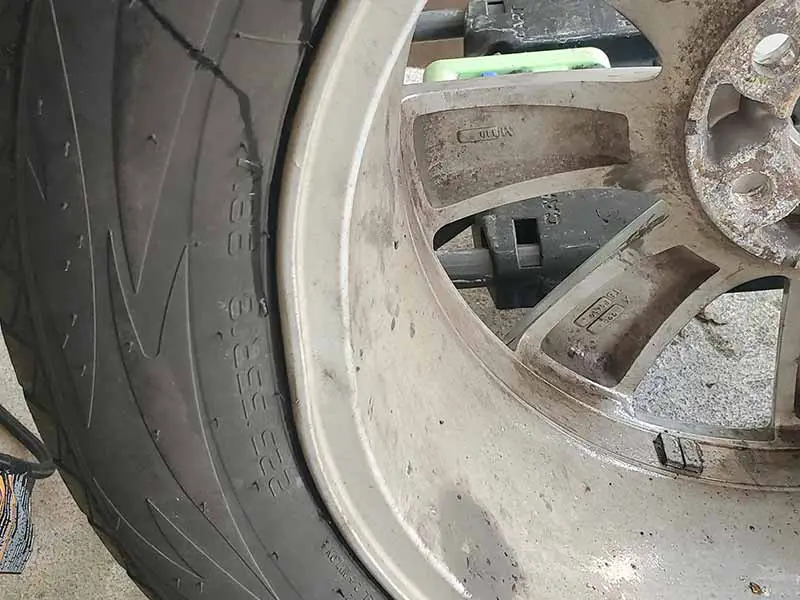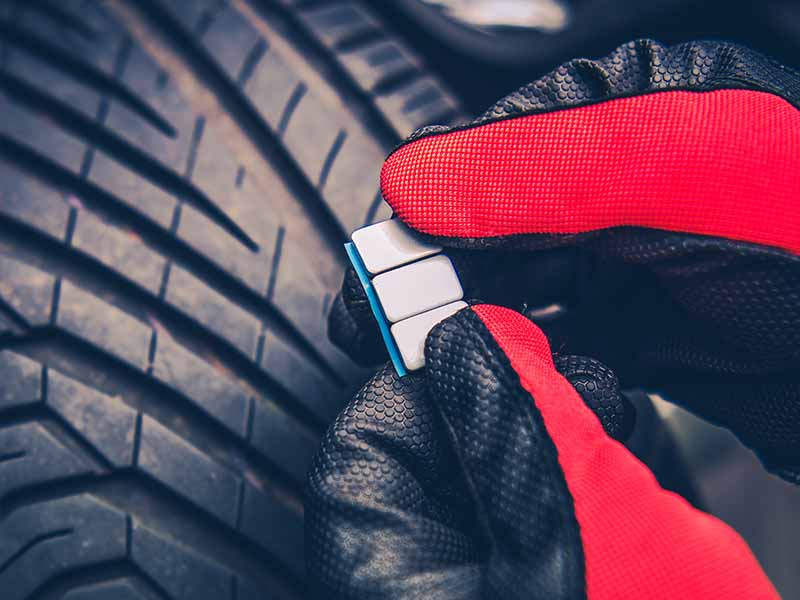How can a brand new tire already be out of balance? You may expect your new tires be perfectly round and even, however, small variations in weight distribution can cause noticeable vibration and uneven wear if they’re not properly balanced.\
Do New Tires Need To Be Balanced?
Yes, new tires should be balanced before they’re installed on your car or truck. The balancing process is more about balancing the wheel and the tire together as a unit to ensure a smooth ride and make sure the tires wear evenly.
By balancing the wheel and tire together, technicians can ensure that your entire assembly is evenly weighted and will spin smoothly. This will not only help prevent vibrations but also prolong the life of your tires by providing even tire wear and long tread life.
Let’s take a closer look.

Why Do New Tires Need To Be Balanced?
Balancing your tires is all about making sure that the weight of the tire and wheel assembly is distributed evenly around the axle. This is important because if one part of the assembly is heavier than the rest, it can cause your vehicle to vibrate or shake when you’re driving, especially at high speeds. And nobody wants that, right?
Now, you might think that your new tires should be perfectly balanced straight out of the box because your new tires are new. And while it’s true that new tires are generally more uniform than old, worn tires, there can still be slight variations in weight between different parts of the tire and wheel. And that’s where balancing comes in.
When you take your car in for a tire replacement or rotation, your mechanic will typically balance your tires as part of the process. But if you’re just buying new tires and having them mounted at home or a tire shop, it’s also a good idea to ask for them to be balanced. It might add a little extra time and cost to the process, but it’s worth it for a smoother, more comfortable ride.
What Happens If New Tires Are Not Balanced?
When your tires aren’t balanced, it can cause all kinds of problems. For one thing, you’re likely to feel a lot of vibration and shaking through the steering wheel and seat when you’re driving, especially at higher speeds. That’s because an unbalanced tire is basically bouncing up and down as it spins, which can make your whole vehicle feel like it’s shaking itself apart.
Not only is this a really uncomfortable and distracting sensation, but it can also be dangerous. When your tires aren’t balanced, it can affect your ability to control your vehicle, especially in emergency situations. And that’s the last thing you want when you’re driving.
Plus, unbalanced tires can wear out much faster than balanced ones. The uneven weight distribution can cause certain parts of the tire to wear down more quickly than others, which means you’ll have to replace your tires more often. And let’s face it; tires aren’t cheap.
- Vibrations: Unbalanced tires can cause noticeable vibrations, especially at higher speeds. This can make for an uncomfortable and potentially dangerous ride.
- Uneven Wear: If your tires are unbalanced, they may wear unevenly, with some areas experiencing more wear than others. This can shorten the lifespan of your tires and require you to replace them sooner than expected.
- Poor Handling: Unbalanced tires can also affect your vehicle’s handling, making it harder to steer and control your car on the road.
- Damage To Suspension Components: If your tires are severely unbalanced, it can put extra stress on your vehicle’s suspension components, leading to premature wear and potentially costly repairs.
- Reduced Fuel Efficiency: If your tires are unbalanced, it can cause extra drag on your vehicle, which can reduce your fuel efficiency and cost you more money at the pump.

Why Are My New Tires Balanced But Still Vibrating?
It’s important to note that balancing your tires doesn’t guarantee a completely vibration-free ride. While balancing helps distribute weight evenly, there can still be other factors at play, such as road conditions or suspension issues.
Another possible explanation is that the balancing wasn’t done correctly. It’s possible that the weights were placed in the wrong spots or that the machine used to balance the tires wasn’t calibrated properly. In these cases, you might need to have your tires rebalanced to fix the issue.
It’s also possible that your new tires are just naturally more prone to vibration than your old ones. Different tire models can have different characteristics, and some might be more susceptible to vibration or noise than others.
Another point worth considering is whether the vibration is actually coming from the tires at all. Sometimes, vibration can be caused by issues with your vehicle’s suspension or alignment. If you’re experiencing vibration and other symptoms like pulling or uneven tire wear, it might be worth having your car or truck inspected by a mechanic to rule out any underlying issues.
How Often Do Tires Need To Be Balanced?
You should have your tires balanced whenever you have them installed, whether they’re new or just being rotated to a new position on your vehicle. This helps ensure a smooth ride and can prevent premature wear on your tires.
Beyond that, how often you need to balance your tires can depend on a few different factors. If you drive on rough or uneven roads frequently, you might need to have your tires balanced more often than someone who sticks to smooth highways.
Similarly, if you notice any signs of vibration or shaking while driving, it’s a good idea to have your tires checked for balance. Even slight imbalances can cause noticeable vibration at high speeds.
Finally, it’s worth noting that some tire models are designed to maintain their balance for longer periods of time than others. If you invest in high-quality tires from a reputable manufacturer, you might be able to go longer between balancing appointments than you would with cheaper or lower-quality tires.
What Throws Tires Out Of Balance?
There are a few different things that can cause them to become unbalanced. Here are some of the most common culprits:
- Uneven Tire Wear: Over time, your tires can wear unevenly due to factors like misalignment, underinflation, overinflation, or a worn suspension. This can cause weight imbalances in the tire, which can, in turn, lead to an unbalanced wheel.
- Damage To The Tire Or Wheel: If you hit a pothole, curb, or another obstacle while driving, it can cause damage to your tire or wheel that can lead to an imbalance. Even minor dents or bends in the rim can throw off the weight distribution and cause vibrations and other issues.
- Missing Wheel Weights: Wheel weights are small pieces of metal attached to the rim to balance out imbalances. Over time, these weights can become loose or fall off, leading to an imbalance in the wheel.
- Poor Installation: If your tires or wheels are not installed correctly, this can lead to imbalances that cause vibrations and other issues. This can be caused by things like improper torquing of the lug nuts, improper seating of the tire bead, or incorrect balancing.

How Are Tires Balanced?
A few different methods can be used to balance your tires. Here’s a quick overview of how each one works:
- Static Balancing: This is the most common method used by tire technicians. It involves mounting the tire and wheel assembly on a balancing machine, which measures the weight distribution of the tire and wheel. The technician will then add weights to the rim until it is balanced.
- Dynamic Balancing: This method is similar to static balancing but considers the tire’s movement as it rotates. The balancing machine will spin the tire at high speeds, and sensors will detect any imbalances. The technician will then add weights to the rim to correct the imbalance.
- Road Force Balancing: This method uses a special machine that applies pressure to the tire as it spins, simulating the weight and forces the tire will experience on the road. The machine then measures the tire’s stiffness and other factors to determine the optimal placement of weights on the rim.
No matter which method is used, the goal is to ensure that the weight of the tire and wheel assembly is evenly distributed. This will help prevent vibrations, reduce wear and tear on your tires, and improve your vehicle’s handling and fuel efficiency.
Resources
Below are some links you may find helpful when learning about tires
Final Thoughts
New tires may be nearly perfectly balanced from the factory, but it’s still important to have them balanced with the wheel they’ll be mounted on.
Even slight imbalances can cause noticeable vibrations, uneven wear, poor handling, and other issues that can affect your safety and your vehicle’s performance. By having your new tires balanced, you can help ensure a smoother, safer ride and get the most out of your investment in new tires.
Good luck and happy motoring.





